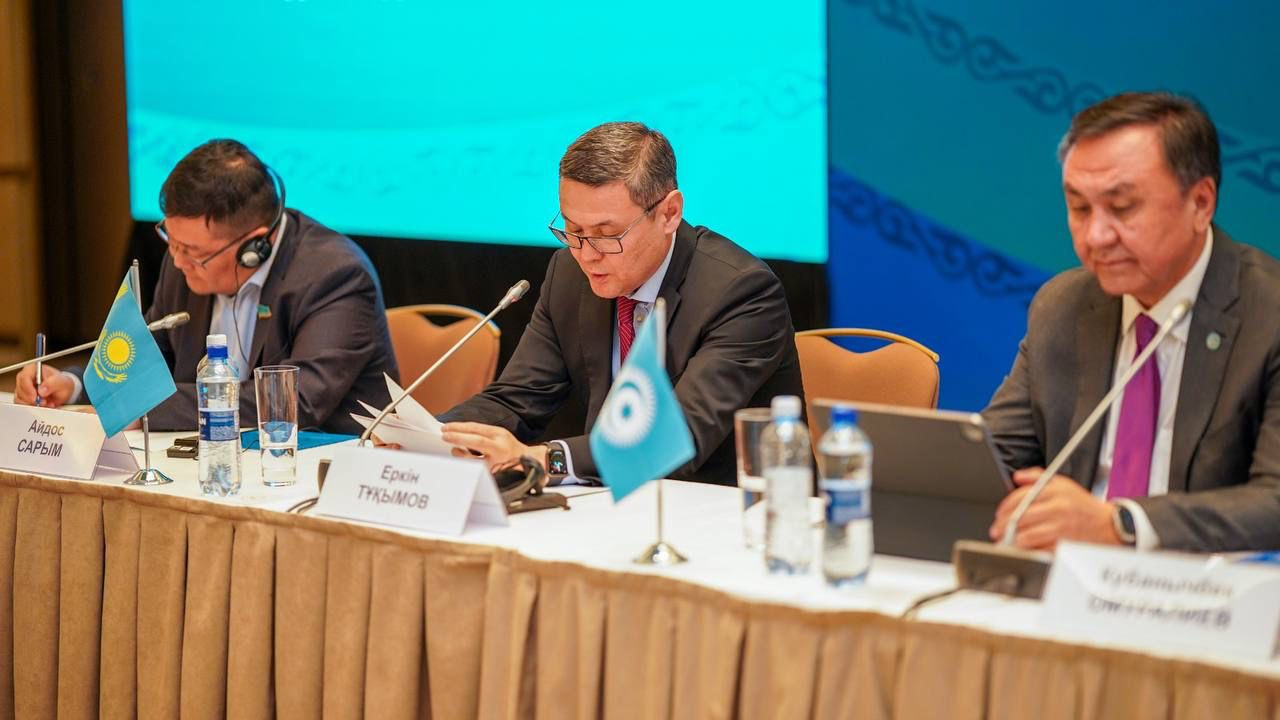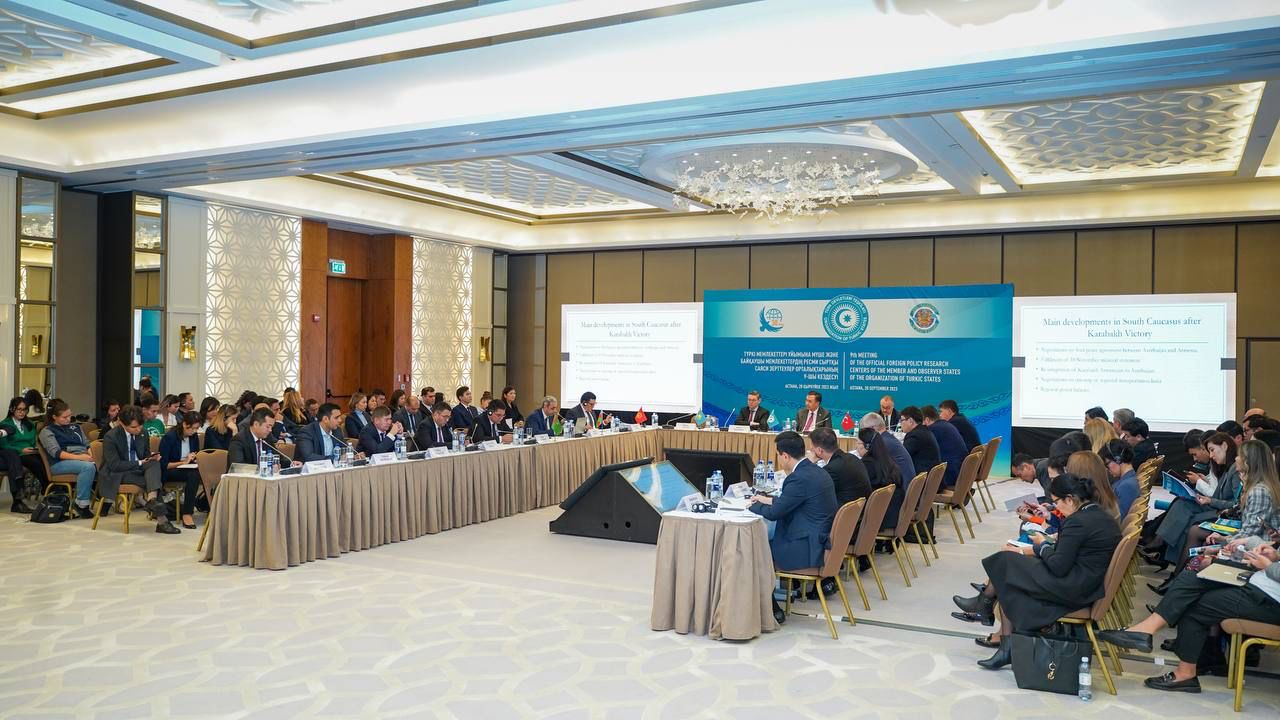ASTANA – The Kazakh capital hosted the ninth meeting of foreign policy research centers from member and observer countries of the Organization of Turkic States (OTS) on Sept. 28 to explore cooperation of Turkic states and dialogue in a turbulent world ahead of the 10th OTS summit in November in Astana.

From L to R: Kazakh deputy Aidos Sarym, KazISS Director Yerkin Tukumov and OTS Secretary General Kubanychbek Omuraliev. Photo credit: KazISS.
The meeting was organized by the Kazakhstan Institute for Strategic Studies (KazISS) and the Ministry of Foreign Affairs.
Shared understanding
Opening the event, KazISS Director Yerkin Tukumov said that over the years, the countries have come closer in issues of cultural and civilizational cooperation and developed a “common understanding” of the role and place of the Turkic world on the international stage.

The meeting will develop a list of recommendations for the leadership of member countries based on discussions during the sessions. Photo credit: KazISS.
Tukumov said the current geopolitical environment is ripe with uncertainty, characterized by the “sharp militarization of international relations, the decline in the effectiveness of international institutions and noncompliance with fundamental norms of international law.”
“It is gratifying that even in such conditions, the position of the Turkic states are close, harmonious and aimed at the formation of a stable world order. In these turbulent times, it is already a reliable foundation on which we build strategic trust relationships,” he said.
The transformation of the Turkic Council into OTS in 2021 signals the “deepening of the cooperation.”
“This marked a new milestone in the shared history of our countries because we set strategic goals aimed at deepening economic cooperation and enhancing transportation connectivity,” said Tukumov.
Need for more joint projects
Speaking about specific projects, he highlighted digital TIR between Kazakhstan, Kyrgyzstan and Uzbekistan designed to streamline customs procedures.
“This project will facilitate the secure data exchange between national customs authorities regarding international cargo transits,” he added.
The project follows the decision of OTS leaders to simplify customs and transport procedures, including through the introduction of digital instruments, laid out in the Istanbul Declaration in November 2021.
Kazakhstan’s place in OTS
He stressed that Kazakhstan, which has historically been at the forefront of establishing OTS, focuses on promoting the development of economic ties among member countries.
“The main interests of our country are the development of an innovative economy and the diversification of transport corridors. Given the ongoing economic reforms and economic diversification in Kazakhstan, trade and economic ties are particularly important for us,” he said.
Kazakhstan, he noted, recognizes the need to increase the export of domestically produced goods abroad.
“The more complex and higher added value is, the higher the incomes for the economy of the Turkic states will be. Participation in export activities by small and medium-sized businesses is of great importance,” he noted.
From 2010 to 2020, Kazakhstan’s trade with OTS countries almost tripled from $4.5 billion to $12.9 billion. Tukumov said Kazakhstan seeks to increase mutual trade turnover to $23 billion.
Türkiye accounts for half of Kazakhstan’s trade with OTS countries, followed by Uzbekistan, Kyrgyzstan and Azerbaijan.
Unleashing the potential of Trans-Caspian International Transport Route
Tukumov also emphasized the paramount importance that Kazakhstan pays to the development of the Trans-Caspian International Transport Route (TITR), which he said can become a “locomotive” of the nation’s transportation and logistics sector in the near future.
“In March 2022. Kazakhstan, Azerbaijan, Turkey and Georgia signed a declaration of the Trans-Caspian East-West corridor, which enhances the significance of the corridor and outlines steps to strengthen the transit potential of the signatory states,” said Tukumov, noting the recent decision of the countries to set up a joint venture.
Tukumov explained the transit period from China to Europe was reduced by at least three times from 53 days to nearly 20 days. The transit through Kazakhstan was cut by half from 12 to six days. By the end of this year, Kazakhstan plans to reduce it to five days.
OTS Secretary General Kubanychbek Omuraliev echoed Tukumov’s words, emphasizing the strategic importance of TITR.
“The geopolitical development in the region has once attested to the vitality of the Middle Corridor as a strategic lifeline not only for our countries but also for the Eurasian continent,” he said.
Economic cooperation remains untapped, according to Omuraliev. The combined GDP exceeds $1.5 trillion, and the total population is around 170 million.
“Leveraging this collective strength can unlock immense potential and solidify our position as key players in a global economic landscape offering a wide range of opportunities to enhance mutual trade and economic cooperation within the strategic region,” said Omuraliev.
The construction of the China-Kyrgyzstan-Uzbekistan railway and the opening of the Zangezur corridor hold significant geopolitical significance.
He noted that cooperation between think tanks contributes to the analysis of the integration process and the deepening of multilateral collaboration among member and observer states.
The OTS was established in 2009 as an intergovernmental organization to promote comprehensive cooperation among Turkic States. Its four founding member states are Azerbaijan, Kazakhstan, Kyrgyzstan, and Türkiye. Uzbekistan joined as a full member in October 2019. Hungary received observer status at the organization in September 2018, and Turkmenistan followed the move in November 2021.
The 10th anniversary summit will take place on Nov. 5 in Astana. Kazakhstan is expected to take over the chairmanship from Uzbekistan.

